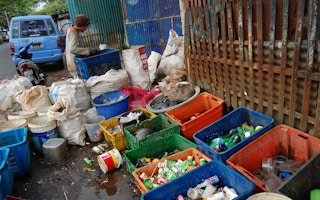A handful of the world’s biggest consumer goods and chemical companies have pooled US$90 million into a fund to find solutions to plastic pollution in South and Southeast Asia.
To continue reading, subscribe to Eco‑Business.
There's something for everyone. We offer a range of subscription plans.
- Access our stories and receive our Insights Weekly newsletter with the free EB Member plan.
- Unlock unlimited access to our content and archive with EB Circle.
- Publish your content with EB Premium.
Beverage makers PepsiCo and Coca-Cola, consumer goods manufacturers Procter & Gamble and Unilever, food producer Danone, and chemical firm Dow will back the initiative led by investment management firm Circulate Capital, which made the announcement yesterday.
With the exception of chemical giant Dow, all of these investors were highlighted as the world’s biggest plastic polluters in a report released by the Break Free from Plastic campaign at the beginning of the month.
The aim of the fund is to remove capital as a “barrier to critical waste and recycling infrastructure development” and demonstrate that waste management is a rewarding sector for investment, said Rob Kaplan, founder and chief executive officer of Singapore-headquartered impact investment firm Circulate Capital, which will manage the funds.
“
While we are working hard to ensure our packaging is designed to be circular, the reality is that it cannot be reused, recycled or composted without effective waste management systems in place.
Katharina Stenholm, chief of cycles and procurement officer, Danone
Kaplan said in a statement: “Institutional investors are unwilling to allocate [funds] to this sector because of a “missing middle”—proven entities that demonstrate a track record of profitability and offer a robust pipeline of investment products.”
The US$90 million pot will go towards financing the riskier stages of development for waste management solutions, which has led some to regard Circulate Capital as a form of blended finance, Kaplan told Eco-Business. “We aim to co-invest as much as possible, and part of our success will be determined by our ability to enable other institutional investors to participate in the sector.”
“While we are working hard to ensure our packaging is designed to be circular, the reality is that it cannot be reused, recycled or composted without effective waste management systems in place,” said Katharina Stenholm, chief of cycles and procurement officer of Danone in a statement. “Financing is often a barrier for proper waste management infrastructure implementation, especially in countries where formal systems are absent or in development.”
Circulate Capital will primarily focus on solutions in India and Indonesia, with Thailand, the Philippines and Vietnam as secondary markets. “However, we are open to investments across the region,” added Kaplan, who said his firm is currently conducting due diligence on potential solutions for investment.
While it is often reported that five Asian countries—China, Indonesia, the Philippines, Thailand and Vietnam—are responsible for 60 per cent of global plastic pollution, what tends to be left out of the picture is the sensitive subject of extended producer responsibility, a concept that states that the onus is on manufacturers to ensure that whatever they produce is disposed of in an environmentally and socially responsible way.
As the Break Free from Plastic campaign makes evident, consumer goods companies such as Coca-Cola and Unilever are selling their plastic-encased products in markets where waste management infrastructure is sorely lacking, leading to environmental pollution. Research has found that 8 million tonnes of plastic enter the ocean every year, harming marine life and causing an epidemic of microplastics, which were recently found in human faeces for the first time.
While a major portion of the US$90 million pot is expected to go towards developing waste collection systems—a recent study by food and beverage trade association Food Industry Asia found that poor rubbish collection systems in Southeast Asia were the main reason for plastic leaking into the ocean—Kaplan said the informal nature of the sector in developing countries make it unbankable to institutional investors.
Circulate will therefore be looking to invest in business models that increase the value of the materials collected by rag-and-bone workers that operate in the space and consequently, their living standards, he explained to Eco-Business.
The Singapore-based company earlier this year unveiled a Request for Proposal process for businesses with solutions to ocean plastic pollution that are looking for investors.
In partnership with business accelerator SecondMuse and non-governmental organisation Ocean Conservancy, it launched The Incubator Network to provide philanthropic funds and technical resources to boost innovation and solutions in order to fight plastic pollution.
Asked if the relatively small figure of US$90 million is sufficient for the task of ending ocean plastics, Kaplan—formerly director of sustainability at Walmart and co-founder of impact investment firm Closed Loop Partners in New York—said the sum reflects the size of the potential market for such solutions, which currently “isn’t as robust as it needs to be.”
He told Eco-Business: “Circulate Capital and other investors would like to deploy more capital, but there simply isn’t enough opportunity or capacity for local communities to absorb it today. Part of our goal is to build that pipeline and investment marketplace for all investors over the next couple years.”








